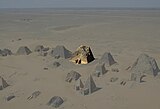| Adikhalamani | |
|---|---|
| Kushite King of Meroe | |
| Reign | First half of the 2nd century BCE |
| Predecessor | Arqamani |
| Successor | Tabirqo (?) |
| Spouse | Nahirqo (?) |
Adikhalamani was a king of Kush, ruling from Meroë in the first half of the 2nd century BCE. [1]
Sources and chronology
Adikhalamani's name is known only from inscriptions at the temple complex of Philae. [2]
Although no burial for Adikhalamani can be securely identified, he is conventionally attributed either Beg. N 8 or Beg. N 9, both located in Meroë and dating to the approximate time of Adikhalamani's reign. Beg. N 8 preserves the fragmentary name "(...)mr(...)t" and Beg. N 9 preserves the name "Tabirqo". László Török (2015) suggested that Tabirqo was a "funerary name" of Adikhalamani and that (...)mr(...)t was a distinct succeeding king. [3] Josefine Kuckertz (2021) instead proposed that Adikhalamani and (...)mr(...)t were the same king and that Tabirqo was a distinct succeeding king. [1] If Kuckertz's identification is accepted, Adikhalamani was the husband of Nahirqo, whose name is recorded in Beg. N 8 and who later ruled as the first queen regnant of Kush. [1]
Adikhalamani is believed to have been contemporary with an Egyptian revolt dated to ca. 207-186 BCE. [4] During this revolt a ruler, Horwennefer (who may have been a Nubian) took control of Thebes and revolted against Ptolemy IV Philopator. The revolt ended ca. 186 BCE when Ankhwennefer (his successor or more likely Horwennefer with a different nomen) was captured and executed. [5]
Titles
- Prenomen: Titenre Setepnetjeru ("Image of Re, chosen of the Gods")
- Nomen: Adikhalamani with epithet Meryiset [4]
References
- ^ a b c Kuckertz, Josefine (2021). "Meroe and Egypt". UCLA Encyclopedia of Egyptology: 5, 11–13.
- ^ Eide, Tormod; Hägg, Tomas; Holton Pierce, Richard; Török, László (1996). Fontes Historiae Nubiorum: Textual Sources for the History of the Middle Nile Region Between the Eighth Century BC and the Sixth Century AD: Vol. II: From the Mid-Fifth to the First Century BC. University of Bergen. p. 590. ISBN 82-91626-01-4.
- ^ Török, László (2015). The Kingdom of Kush: Handbook of the Napatan-Meroitic Civilization. BRILL. p. 204. ISBN 978-90-04-29401-1.
- ^ a b László Török, The kingdom of Kush: handbook of the Napatan-Meroitic Civilization, 1997
- ^ The Ptolemaic Dynasty Archived February 4, 2011, at the Wayback Machine by Chris Bennett, retrieved June 2, 2010
| Adikhalamani | |
|---|---|
| Kushite King of Meroe | |
| Reign | First half of the 2nd century BCE |
| Predecessor | Arqamani |
| Successor | Tabirqo (?) |
| Spouse | Nahirqo (?) |
Adikhalamani was a king of Kush, ruling from Meroë in the first half of the 2nd century BCE. [1]
Sources and chronology
Adikhalamani's name is known only from inscriptions at the temple complex of Philae. [2]
Although no burial for Adikhalamani can be securely identified, he is conventionally attributed either Beg. N 8 or Beg. N 9, both located in Meroë and dating to the approximate time of Adikhalamani's reign. Beg. N 8 preserves the fragmentary name "(...)mr(...)t" and Beg. N 9 preserves the name "Tabirqo". László Török (2015) suggested that Tabirqo was a "funerary name" of Adikhalamani and that (...)mr(...)t was a distinct succeeding king. [3] Josefine Kuckertz (2021) instead proposed that Adikhalamani and (...)mr(...)t were the same king and that Tabirqo was a distinct succeeding king. [1] If Kuckertz's identification is accepted, Adikhalamani was the husband of Nahirqo, whose name is recorded in Beg. N 8 and who later ruled as the first queen regnant of Kush. [1]
Adikhalamani is believed to have been contemporary with an Egyptian revolt dated to ca. 207-186 BCE. [4] During this revolt a ruler, Horwennefer (who may have been a Nubian) took control of Thebes and revolted against Ptolemy IV Philopator. The revolt ended ca. 186 BCE when Ankhwennefer (his successor or more likely Horwennefer with a different nomen) was captured and executed. [5]
Titles
- Prenomen: Titenre Setepnetjeru ("Image of Re, chosen of the Gods")
- Nomen: Adikhalamani with epithet Meryiset [4]
References
- ^ a b c Kuckertz, Josefine (2021). "Meroe and Egypt". UCLA Encyclopedia of Egyptology: 5, 11–13.
- ^ Eide, Tormod; Hägg, Tomas; Holton Pierce, Richard; Török, László (1996). Fontes Historiae Nubiorum: Textual Sources for the History of the Middle Nile Region Between the Eighth Century BC and the Sixth Century AD: Vol. II: From the Mid-Fifth to the First Century BC. University of Bergen. p. 590. ISBN 82-91626-01-4.
- ^ Török, László (2015). The Kingdom of Kush: Handbook of the Napatan-Meroitic Civilization. BRILL. p. 204. ISBN 978-90-04-29401-1.
- ^ a b László Török, The kingdom of Kush: handbook of the Napatan-Meroitic Civilization, 1997
- ^ The Ptolemaic Dynasty Archived February 4, 2011, at the Wayback Machine by Chris Bennett, retrieved June 2, 2010


